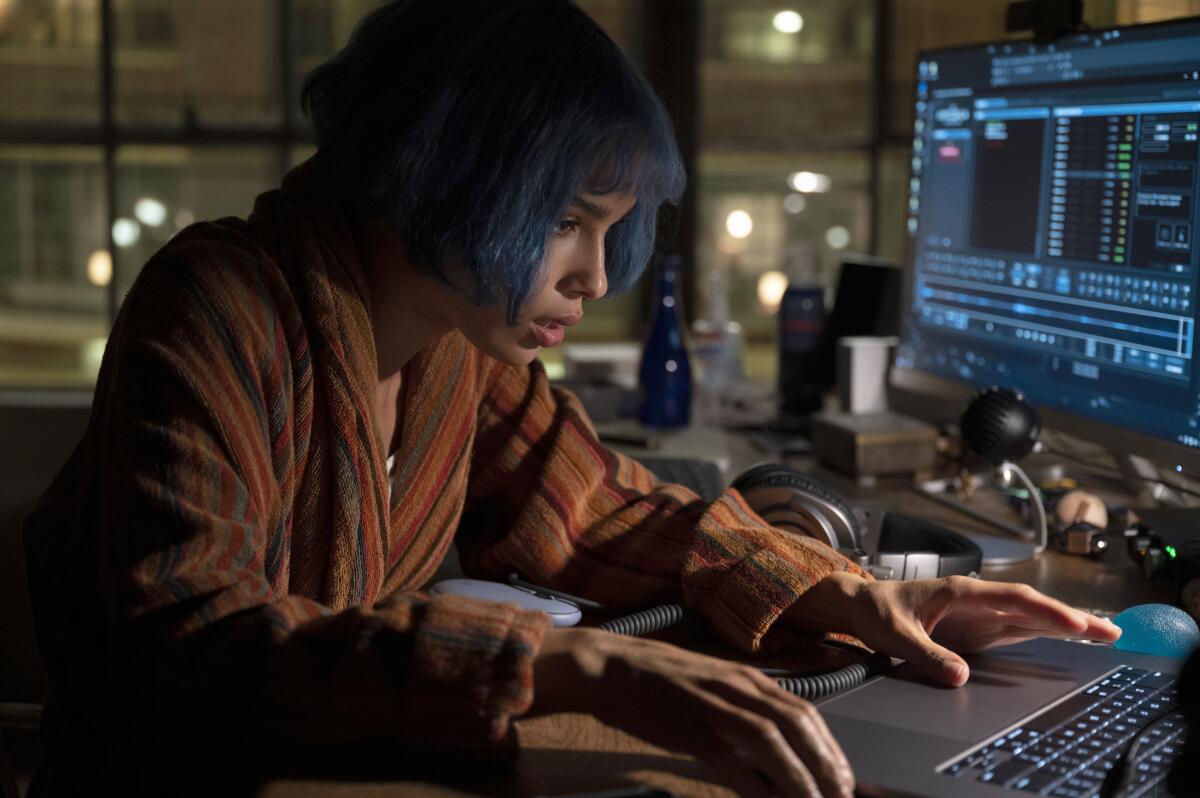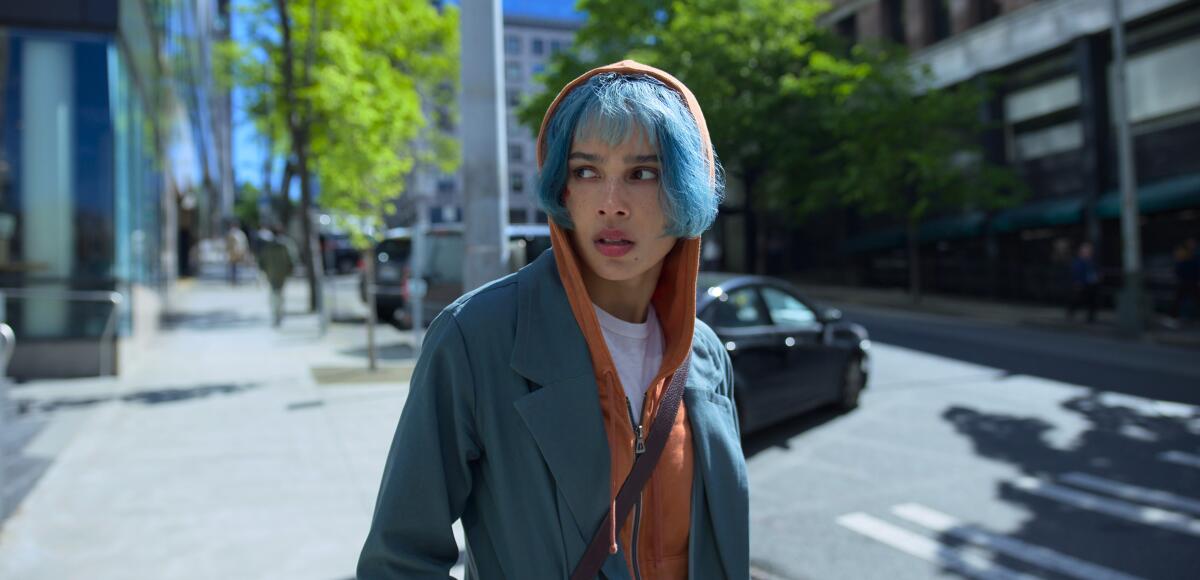Steven Soderbergh’s HBO Max thriller ‘Kimi’ is ‘Parallax View’ for the pandemic era

- Share via
The key art for “Kimi,” Steven Soderbergh’s nifty new micro-thriller, features a glum-faced, blue-haired young woman in an orange hoodie. You might reasonably conclude that this is Kimi, but no, her name is actually Angela. She works for the tech company that created Kimi, a high-tech virtual assistant that answers its customer’s every request with a bright magenta light and a reassuring “I’m here.” Like Siri or Alexa, but with more sophisticated (Read: Invasive) learning capabilities, Kimi will dim your lights, play your music and even fire up HBO Max, which is where you’ll find this latest fictional dispatch from a world under self-imposed 24-7 surveillance.
Soderbergh drops us into that world with a casualness that’s unnerving precisely because of how unnerving it isn’t; this is how we live now, he and screenwriter David Koepp suggest, with a pandemic outside our windows and the world at our fingertips. Most of “Kimi” unfolds in the spacious Seattle loft that Angela calls home, though we soon see that it has also become her gym, her workspace and her permanent refuge.
Like the heroine of last year’s misbegotten “The Woman in the Window” and many a shut-in protagonist before her, Angela (played by Zoë Kravitz) is agoraphobic, an anxiety disorder she says she’d gotten a handle on until COVID-19 lockdown set in. Now she’s content never to leave her almost entirely Kimi-run apartment, outsourcing menial tasks to an inanimate hub that records her every data point and keeps her under 24-7 digital surveillance.
Soderbergh and Koepp grasp that in a world of Alexas and iPhones, Angela’s condition — the tech addiction, not the agoraphobia — is a near-universal one. But in this case, in a sly nod to “The Conversation,” the surveilled also happens to be doing a little of her own surveilling. As a voice stream interpreter, Angela spends her days listening to audio clips from customers whose requests Kimi didn’t understand, then writes the code that will fix the error, making Kimi a smarter, more user-friendly service. It’s a tedious job, but Angela doesn’t mind tedium. Certainly, it’s preferable to the moment she clicks on an audio stream and surmises, from the sounds of a woman’s terrified screams, that Kimi has recorded evidence of a violent crime in progress.
Angela, stirred by empathy and perhaps something more, tries to report her findings to the company — and then, when she’s instructed to ignore the matter, decides to do a little digging of her own. By this point, we’re fully engrossed; Angela is a computer whiz and a savvy detective, and her sleuthing — with a little extra IT support from a Romanian colleague (an amusing Alex Dobrenko) — exerts its own insidious hold. Soderbergh, shooting and editing under his usual pseudonyms (Peter Andrews and Mary Ann Bernard, respectively), has a gift for satirizing corporate mundanity, and for making everyday minutiae mesmerizing. He can turn typing fingers and blinking cursors into the stuff of quietly engrossing drama.
For the record:
1:22 p.m. Feb. 10, 2022An earlier version of this review incorrectly credited the score to Randy Miller. Cliff Martinez composed the score; Miller conducted and orchestrated.
He is also, not for the first time, using contemporary technology to riff on great crime movies from an earlier era. The faces of Angela’s across-the-street neighbors (including Byron Bowers and Devin Ratray) bring the inevitable specter of “Rear Window” into view. (Cliff Martinez’s score compounds the Hitchcock vibes with a rich Bernard Herrmann-esque lushness.) But as Angela’s investigation pulls her deeper into the weeds — bringing her into contact with a top executive (a terrific Rita Wilson) whose warm smile offers the opposite of reassurance — “Kimi” begins to take on the paranoid-thriller contours of Alan J. Pakula’s 1974 classic, “The Parallax View.” Those who’ve followed Soderbergh’s recent work may also be reminded of the murderous corporate conspiracy in last year’s “No Sudden Move,” which is set in the 1950s automobile industry. Times and technologies may change, but the banality of capitalist evil never does.

That’s depressing to contemplate, but Soderbergh, an inveterate entertainer even (especially) at his most cynical, also makes it fun to watch. Much of the pleasure of “Kimi,” which compacts a lot of information and ideas into a brisk 89 minutes, comes from the way it repurposes an old-school genre template with up-to-the-minute materials. You may giggle a little as Koepp plants his narrative seeds at the beginning — a rotting tooth, an upstairs construction job, a news bulletin about protests downtown — knowing full well that by the end they’ll come to fruition. And the role that Kimi itself plays in the proceedings — hero, villain or accomplice? — suggests a healthy ambivalence on Soderbergh’s part about the good and the bad of technology’s pervasive reach into our 21st-century lives.
But “Kimi” the movie, much like Kimi the virtual assistant, needs human intelligence to do its job effectively. And it more than finds that intelligence in Kravitz, who makes an enormously likable protagonist, in part because of how uninterested she is in seeming likable. Angela’s fear of the outdoors earns your sympathy, and her diligence and resourcefulness awaken your admiration. But she can also be impatient and rude, subjecting friends, potential lovers and family members (Robin Givens FaceTimes in as Angela’s mom) to her curt demands and quick temper. Some of this may be germane to the character; some of it you may recognize as mid-pandemic irritability, a chronic condition and general social malaise as contagious as COVID-19 itself.
That’s why it’s both harrowing and strangely moving when Angela, stirred by conscience and empathy for a female victim she’ll never meet, finally musters the courage to leave the apartment and spring into action. Her anxiety is overwhelming at first, and as “Kimi” shifts into chase-thriller mode, her bright blue hair, among other things, makes her a conspicuous target. Soderbergh himself stalks Angela with all the formal resources at his disposal, using harsh lighting, tilted angles and loud city noises to put her disorientation into nerve-jangling visual and aural terms. But he also shows us, gradually at first and then with quickening purpose, a world of friendly faces — some masked, some not — that might just be starting to shake off its pandemic limbo.
In these moments, “Kimi” becomes a kind of cautionary tale for the COVID-cautious: The world, it suggests, might be a big and scary place, but it’s a world that we, like Angela, must reconnect with in our own time. After all, it may be no more perilous a place than our own digitally booby-trapped houses and offices, as the movie makes clear with an unduly satisfying finale and perhaps its slyest reference: When someone is always watching or listening, you’re never truly home alone.
‘Kimi’
Rating: R, for violence, language and brief sexuality/nudity
Playing: HBO Max, starting Feb. 10
Running time: 1 hour, 29 minutes
More to Read
Only good movies
Get the Indie Focus newsletter, Mark Olsen's weekly guide to the world of cinema.
You may occasionally receive promotional content from the Los Angeles Times.










